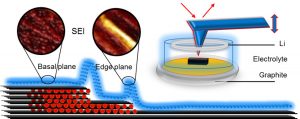 Thomas S. Miller
Thomas S. Miller
Associate Professor in Electrochemistry and Materials Science
Electrochemical Innovation Lab
Department of Chemical Engineering
University College London, UK
Date: March 27, 2024
Time: 1000–1100h ET
The successful deployment of materials for advanced batteries requires an in-depth understanding of the correlation between their electrochemical performance and structural and mechanical evolution across multiple length scales. The reaction kinetics of their interfacial processes must also be quantified. In situ and operando electrochemical atomic force microscopy (EC-AFM) is a powerful tool that can simultaneously reveal these relationships with nanoscale resolution [1].
By using EC-AFM to study the electrode-electrolyte interface of anode materials in lithium ion [2], zinc ion [3-5] and sodium ion batteries [6], unique changes in their morphological and nano-mechanical behavior have been revealed as they cycle, develop, and degrade. Together, by discussing a variety of studies, the versatility of EC-AFM for characterizing batteries is demonstrated, particularly its ability to reveal phenomena that other commonly utilized tools are blind to. This highlights the important role EC-AFM can play in facilitating the progress of future battery research.
An interactive Q&A session follows the presentation.
[1] Z. Zhang et al. Adv. Energy Mater., 11, 2101518 (2021)
[2] Z. Zhang et al. ACS Appl. Mater. Interfaces, 12, 31, 35132–35141 (2020)
[3] X Guo et al ACS Energy Lett., 6, 2, 395–403 (2021)
[4] M. Liu et al. Nano Lett., 23, 2, 541–549 (2023)
[5] Z. Zhang et al. J. Mater. Chem. A, 9, 15355-15362 (2021)
[6] S. Said et al. ACS Nano, 17, 7, 6220–6233 (2023)
Benefits of attending the webinar
-
Learn how scanning probe microscopy can be applied to operating batteries;
-
Discover how the dynamic and evolving nature of the electrode-electrolyte interface impacts battery performance.
-
Understand how next-generation battery materials offer hope of higher cell capacities, however, appreciate that major challenges must still be overcome.
Thomas S. Miller
Thomas S. Miller is an Associate Professor in Electrochemistry and Materials Science and Lecturer in Chemical Engineering at University College London (UCL). An expert in electrochemical technologies, he works in UCL’s Electrochemical Innovation Lab (EIL). His core research focus is the development of electrochemical energy storage and conversion technologies, including batteries, supercapacitors, fuel cells, and electrolyzers. Dr. Miller has developed nanomaterials for catalysis and sensing, applied electrochemical techniques, including novel scanning probe electrochemical microscopy, across fundamental and applied projects in the key areas of electrochemical energy storage and conversion. He has also made significant contributions in the field of materials science by developing new and important nanomaterial processing methods and moving novel materials into industry-relevant devices. Dr. Miller received his MChem (2009) and PhD (2014) from the University of Warwick. He previously held an EPSRC (Engineering and Physical Sciences Research Council) Fellowship and is involved with LiSTAR, the Faraday Institution lithium sulfur batteries project.
Learn more about upcoming ECS Webinars and review our previous webinar recordings.
Interested in presenting in the ECS Webinar Series? Email your presentation title and abstract to education@electrochem.org for consideration.


